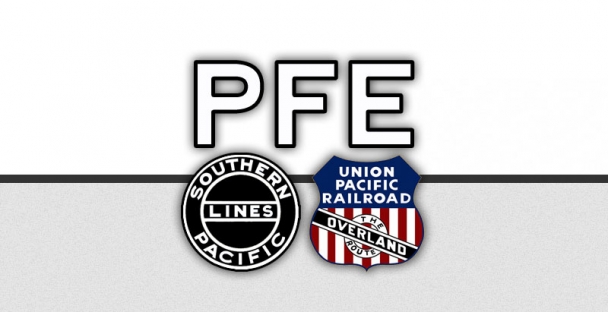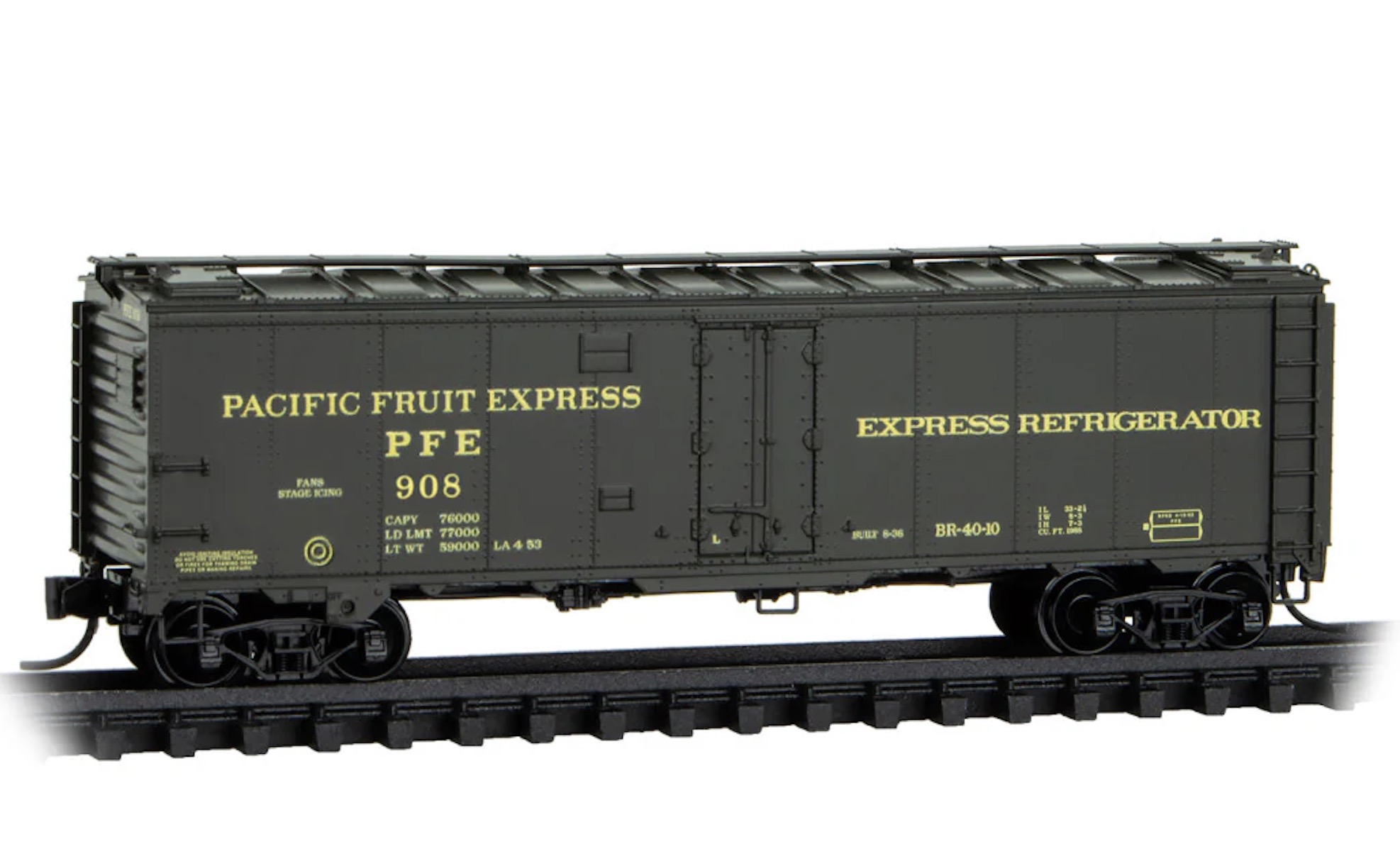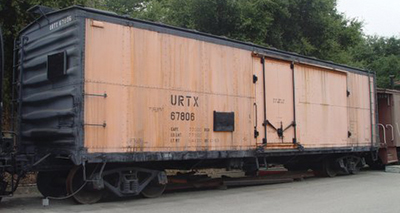Specific Item Information: These class BR-40-10 refrigerator cars were converted from R-40-10’s between 1951-1953. They received overhead electric fans and several additional updates. These express cars were painted a passenger dark olive with dulux gold lettering, and featured bettendorf trucks.
Model Information: The prototype for this model is the PFE R-40-10 ice reefer built in 1936 and 1937.
MTL released this model with various road names, for which the actual prototype might in fact be different.
MTL released this model with various road names, for which the actual prototype might in fact be different.
Prototype History: A refrigerator car (or “reefer”) is a refrigerated boxcar (US) or van (UIC), a piece of railroad rolling stock designed to carry perishable freight at specific temperatures. Refrigerator cars differ from simple insulated boxcars and ventilated boxcars (commonly used for transporting fruit), neither of which are fitted with cooling apparatus. Reefers can be ice-cooled, come equipped with any one of a variety of mechanical refrigeration systems, or utilize carbon dioxide (either as dry ice, or in liquid form) as a cooling agent. Milk cars (and other types of “express” reefers) may or may not include a cooling system, but are equipped with high-speed trucks and other modifications that allow them to travel with passenger trains.
By the 1940's, new reefers were being built entirely of steel. Insulating techniques improved to the point where economical refrigeration could be accomplished using steel side plates in place of wood sheathing. Cars with steel roofs and sides were more durable and required fewer repairs.
The General American Transportation Corporation built several 40' steel reefer for the Union Refrigerator Transit Line (URTX) from the late 1940's into the 1950's.
This reefer was 40' long & weighted 61,500 lbs. The car is a steel bodied reefer with iced bunkers at each end. These ice bunkers hold 10,400 lbs. of chunk ice or 11,500 lbs. of crushed ice. Ice stations were located every 100-150 miles along the railroads main line to replace the melted ice. In the winter, charcoal heaters could be placed in the bunkers to keep the cargo from freezing. Fans are located in the floor at each end to circulate air and keep an even temperature throughout the car. Typical cargo would be fresh fruit, vegetables or eggs.
American Car & Foundry (ACF Industries) also built 40' reefer for several companies.
By the 1940's, new reefers were being built entirely of steel. Insulating techniques improved to the point where economical refrigeration could be accomplished using steel side plates in place of wood sheathing. Cars with steel roofs and sides were more durable and required fewer repairs.
The General American Transportation Corporation built several 40' steel reefer for the Union Refrigerator Transit Line (URTX) from the late 1940's into the 1950's.
This reefer was 40' long & weighted 61,500 lbs. The car is a steel bodied reefer with iced bunkers at each end. These ice bunkers hold 10,400 lbs. of chunk ice or 11,500 lbs. of crushed ice. Ice stations were located every 100-150 miles along the railroads main line to replace the melted ice. In the winter, charcoal heaters could be placed in the bunkers to keep the cargo from freezing. Fans are located in the floor at each end to circulate air and keep an even temperature throughout the car. Typical cargo would be fresh fruit, vegetables or eggs.
American Car & Foundry (ACF Industries) also built 40' reefer for several companies.
Road Name History:  Pacific Fruit Express (reporting mark PFE) was an American railroad refrigerator car leasing company that at one point was the largest refrigerator car operator in the world. The company was founded on December 7, 1906 as a joint venture between the Union Pacific and Southern Pacific railroads. It began operation on October 1, 1907, with a fleet of 6,600 refrigerator cars built by the American Car and Foundry Company (ACF).
Pacific Fruit Express (reporting mark PFE) was an American railroad refrigerator car leasing company that at one point was the largest refrigerator car operator in the world. The company was founded on December 7, 1906 as a joint venture between the Union Pacific and Southern Pacific railroads. It began operation on October 1, 1907, with a fleet of 6,600 refrigerator cars built by the American Car and Foundry Company (ACF).
In 1923, the Western Pacific Railroad joined the venture by leasing its own, brand new fleet of 2775 reefers to PFE. They were painted in standard PFE colors with only WP heralds on the cars instead of the paired UP-SP markings. The WP cars were all retired by the late 1950s, among the last wooden reefers in PFE's fleet. WP ended its partnership with PFE in late 1967 and joined Fruit Growers Express instead.
PFE's assets were divided between the UP and SP when the company was split on April 1, 1978. It is now a UP subsidiary.

In 1923, the Western Pacific Railroad joined the venture by leasing its own, brand new fleet of 2775 reefers to PFE. They were painted in standard PFE colors with only WP heralds on the cars instead of the paired UP-SP markings. The WP cars were all retired by the late 1950s, among the last wooden reefers in PFE's fleet. WP ended its partnership with PFE in late 1967 and joined Fruit Growers Express instead.
PFE's assets were divided between the UP and SP when the company was split on April 1, 1978. It is now a UP subsidiary.
Brand/Importer Information: Micro-Trains is the brand name used by both Kadee Quality Products and Micro-Trains Line. For a history of the relationship between the brand and the two companies, please consult our Micro-Trains Collector's Guide.
Manufacturer Information:  Micro-Trains Line split off from Kadee Quality Products in 1990. Kadee Quality Products originally got involved in N-Scale by producing a scaled-down version of their successful HO Magne-Matic knuckle coupler system. This coupler was superior to the ubiquitous 'Rapido' style coupler due to two primary factors: superior realistic appearance and the ability to automatically uncouple when stopped over a magnet embedded in a section of track. The success of these couplers in N-Scale quickly translated to the production of trucks, wheels and in 1972 a release of ready-to-run box cars.
Micro-Trains Line split off from Kadee Quality Products in 1990. Kadee Quality Products originally got involved in N-Scale by producing a scaled-down version of their successful HO Magne-Matic knuckle coupler system. This coupler was superior to the ubiquitous 'Rapido' style coupler due to two primary factors: superior realistic appearance and the ability to automatically uncouple when stopped over a magnet embedded in a section of track. The success of these couplers in N-Scale quickly translated to the production of trucks, wheels and in 1972 a release of ready-to-run box cars.
Micro-Trains Line Co. split off from Kadee in 1990 to form a completely independent company. For this reason, products from this company can appear with labels from both enterprises. Due to the nature of production idiosyncrasies and various random factors, the rolling stock from Micro-Trains can have all sorts of interesting variations in both their packaging as well as the products themselves. When acquiring an MTL product it is very important to understand these important production variations that can greatly enhance (or decrease) the value of your purchase.
Please consult our Micro-Trains Collector's Guide

Micro-Trains Line Co. split off from Kadee in 1990 to form a completely independent company. For this reason, products from this company can appear with labels from both enterprises. Due to the nature of production idiosyncrasies and various random factors, the rolling stock from Micro-Trains can have all sorts of interesting variations in both their packaging as well as the products themselves. When acquiring an MTL product it is very important to understand these important production variations that can greatly enhance (or decrease) the value of your purchase.
Please consult our Micro-Trains Collector's Guide
Item created by: CNW400 on 2024-07-27 09:36:37
If you see errors or missing data in this entry, please feel free to log in and edit it. Anyone with a Gmail account can log in instantly.
If you see errors or missing data in this entry, please feel free to log in and edit it. Anyone with a Gmail account can log in instantly.




